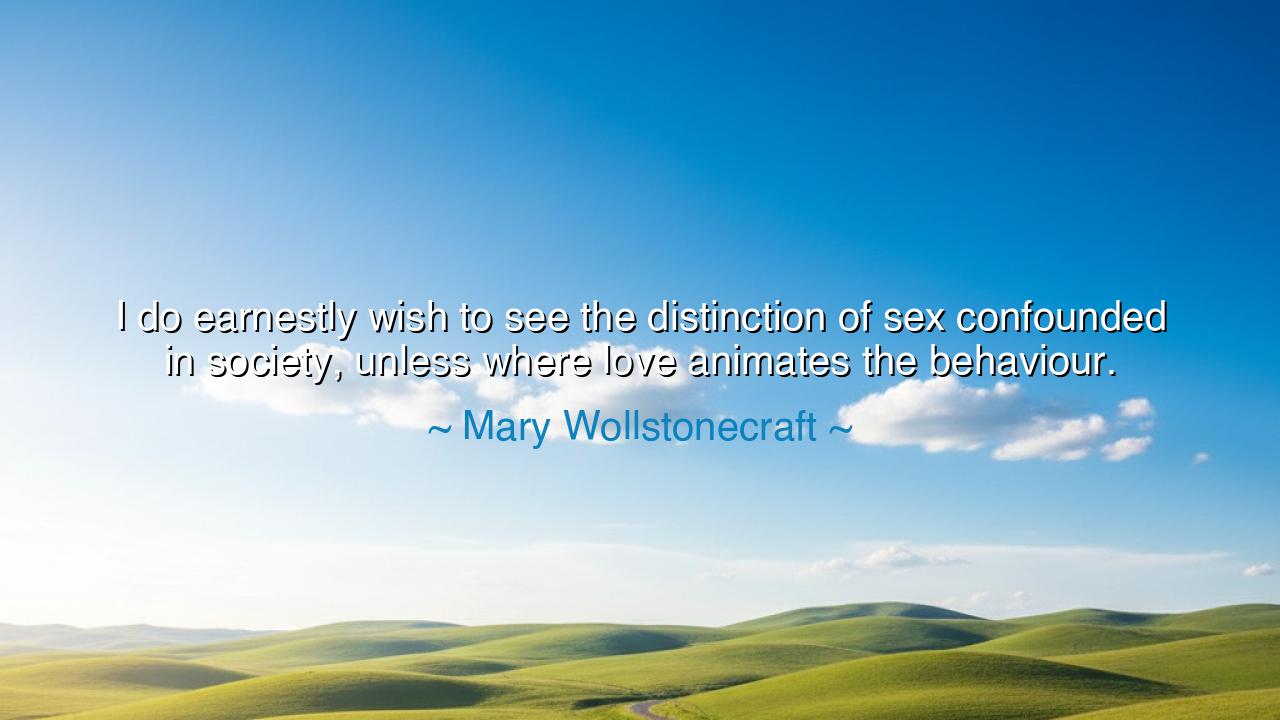
I do earnestly wish to see the distinction of sex confounded in
I do earnestly wish to see the distinction of sex confounded in society, unless where love animates the behaviour.






Hear the bold and unyielding words of Mary Wollstonecraft, who declared: “I do earnestly wish to see the distinction of sex confounded in society, unless where love animates the behaviour.” These are not the idle musings of a dreamer, but the fierce proclamation of a thinker who dared to challenge the deepest prejudices of her age. In her voice we hear the cry for equality, a demand that men and women alike be measured not by their sex, but by their reason, their virtue, and their humanity. She longed for a society where the chains of false distinctions would be shattered, leaving only love—not oppression—as the rightful difference between the sexes.
The origin of this thought lies in Wollstonecraft’s great work, A Vindication of the Rights of Woman (1792). Living in a world where women were seen as ornaments, property, or playthings, she fought with her pen against the blindness of tradition. Her words were a challenge to the philosophers and politicians of the Enlightenment, who spoke of liberty and equality yet denied them to half of humanity. By demanding that the distinction of sex be “confounded,” she was not erasing difference but rejecting the false hierarchy that made women lesser. She sought to raise women into full participation in education, politics, and virtue, where their humanity would stand equal to that of men.
The ancients themselves offered glimpses of this truth. In Sparta, women were trained in physical strength, allowed to own property, and encouraged to speak their minds, for the state recognized that strong mothers bore strong citizens. Though imperfect, it showed that when society lifts the restrictions on women, the whole community gains in strength. Wollstonecraft echoed this ancient lesson, declaring that to confine women to ignorance and dependence was not only unjust, but a crime against the flourishing of nations.
History gives us another tale in the life of Emmeline Pankhurst and the suffragettes of England. They shattered the silence imposed upon women, demanding the right to vote, to speak, to act as citizens rather than subjects. Their battle, fierce and unrelenting, was the continuation of Wollstonecraft’s vision: to confound the distinction of sex where it served only oppression. They were called mad, hysterical, dangerous—but in truth, they were heralds of justice, tearing away the veil of inequality. And from their struggle, society itself was reborn into greater fairness.
The meaning of Wollstonecraft’s words is thus twofold. First, she called for the collapse of false hierarchies built upon sex—those customs and laws that chained women in subservience. Second, she exalted love as the only rightful distinction, the place where difference becomes beauty, where man and woman meet not as master and subject but as partners in affection. For in the realm of love, distinctions may animate behavior without enslaving dignity; but in the realm of society, justice demands equality.
What lesson, then, shall we take from this? That equality between men and women is not merely a political demand but a moral one, a foundation of justice itself. We must resist the subtle chains of prejudice that still linger, the expectations that confine women to roles not of their choosing. We must honor love as a sacred space of difference, but banish inequality from every other sphere. In workplaces, in education, in law, let sex no longer be the measure of worth.
Therefore, children of the future, engrave this teaching upon your hearts: do not let distinctions of sex enslave the human spirit. Honor equality in every corner of society, and let love alone be the field where differences flourish freely. For when the false chains are broken, humanity stands taller, wisdom deepens, and justice shines brighter. Wollstonecraft’s voice calls across the centuries, urging us onward: to confound oppression, to exalt equality, and to let love, and love alone, be the guide of difference.






AAdministratorAdministrator
Welcome, honored guests. Please leave a comment, we will respond soon